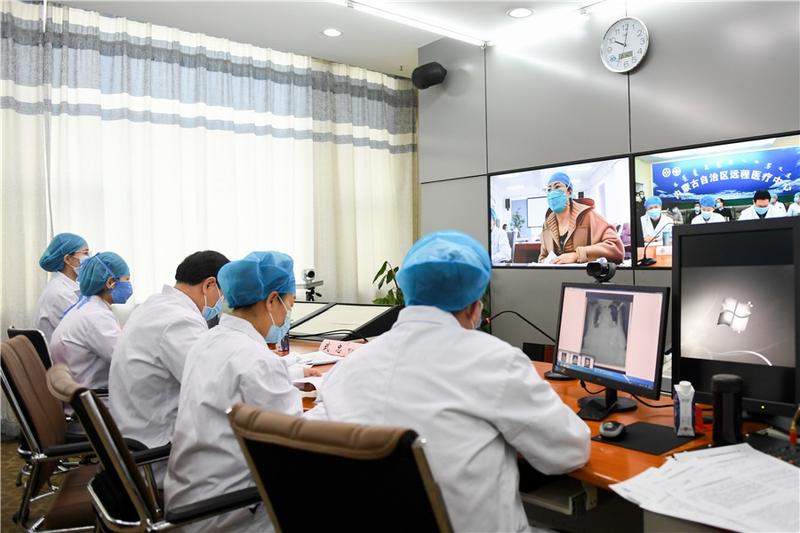 Medical experts hold online consultations at the Telemedicine Center of the Inner Mongolia autonomous region in Hohhot on Feb 14, 2020. (PHOTO / XINHUA)
Medical experts hold online consultations at the Telemedicine Center of the Inner Mongolia autonomous region in Hohhot on Feb 14, 2020. (PHOTO / XINHUA)
China's digital healthcare industry has embraced new opportunities as the nation has seen the largest application of digital healthcare methods and technologies, with the market space forecast to be worth several trillion yuan in the years ahead, according to a report.
According to the report issued by think tanks which include the Chinese Academy of Social Sciences, the COVID-19 pandemic has exerted a deep influence on the global healthcare system. In addition to the achievements gained in epidemic prevention and control, the country is enhancing its capabilities with the help of internet healthcare.
"The rapid revolution of digital technologies will promote the development of new infrastructure in digital healthcare, empowering sectors including medical service, public healthcare, drug supply, health protection and healthcare management," said Zhi Zhenfeng, a research fellow at the Institute of Law under CASS.
The rapid revolution of digital technologies will promote the development of new infrastructure in digital healthcare, empowering sectors including medical service, public healthcare, drug supply, health protection and healthcare management.
Zhi Zhenfeng, Research fellow at the Institute of Law under CASS
ALSO READ: Digital healthcare moves foster medical industry transformation in China
Beijing-based market research consultancy Analysys said China's internet healthcare market is estimated to reach 196.1 billion yuan (US$27.7 billion) in 2020, expanding by 46.7 percent on a year-on-year basis. In 2019, the market volume surged by 35.6 percent year-on-year to 133.7 billion yuan.
This year, the internet healthcare market will continue to rapidly develop. With the introduction of favorable policies, refined sectors such as registration, diagnosis and drug purchases will become more mature, and accumulate a great user base, the Analysys report said.
Chen Qiaoshan, a medical analyst at Analysys, said that with an increase in the public's health literacy, the healthcare concept of people has changed from "treating the disease" to "preventing the disease in advance".
The follow-up visits by users are likewise surging after online consultations and they are willing to pay for the service.
"More than 70 percent of the users acknowledge internet-based healthcare service and have the willingness to pay, demonstrating the rapid development of the industry," she said.
In the digital healthcare sector, many outstanding internet companies have evolved, bringing about business models that set an example for the industry.
Jianke.com, China's leading business-to-consumer pharmaceutical e-commerce platform, established an offline-to-online (O2O) model, combining initial offline consultations with online follow-up consultations to offer efficient service and convenience to patients.
Hangzhou-based digital health company WeDoctor launched the Health Maintenance Platform, which combined the efforts of medical service, drug, medical insurance and health management to promote the efficiency of regional health institutions, improve public health and save the government's medical expenditure.
The platform has been launched in many regions such as Tianjin, Fujian, Henan, Hubei and Shandong.
Ping An Good Doctor, the Chinese mainland's leading online health service provider which is listed in Hong Kong, said the number of its newly registered users soared tenfold with the onset of the coronavirus outbreak.
In 2019, its registered users jumped by 18.9 percent year-on-year to 315 million. Its monthly paying users reached 2.97 million, and some 729,000 users consult by using its platform daily.
Ping An Good Doctor's artificial intelligence-empowered online platform ensured both the quantity and quality of medical service, and raised the paying rate of users, the report from Analysys said.
Analysys added that because of the fight against the epidemic, internet healthcare has gained the trust of mainstream consumers, and its complementary role to the physical healthcare sector was acknowledged. More cooperation opportunities between hospitals, pharmaceutical firms and insurance companies will emerge as a result.
READ MORE: Huami steps up efforts in R&D of digital healthcare products
With the public's rising awareness of healthcare, the front-end of the industry has expanded and turned health condition intervention into a key sector.
"Taking health management as an entry point makes it easier for internet healthcare firms to accumulate traffic," Chen said.
Analysys said given the background of medical reform and the epidemic, the pharmaceutical industry faces a reshuffle, with drug e-commerce becoming a key point in industrial integration.
China should grasp opportunities of digital healthcare development, enhance policy support and industry incentives, promote technical innovation, better serve the public and contribute to the country's economic development, Zhi from CASS said.


